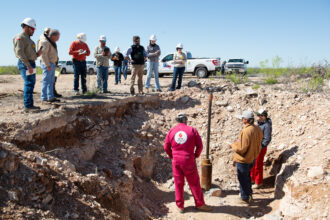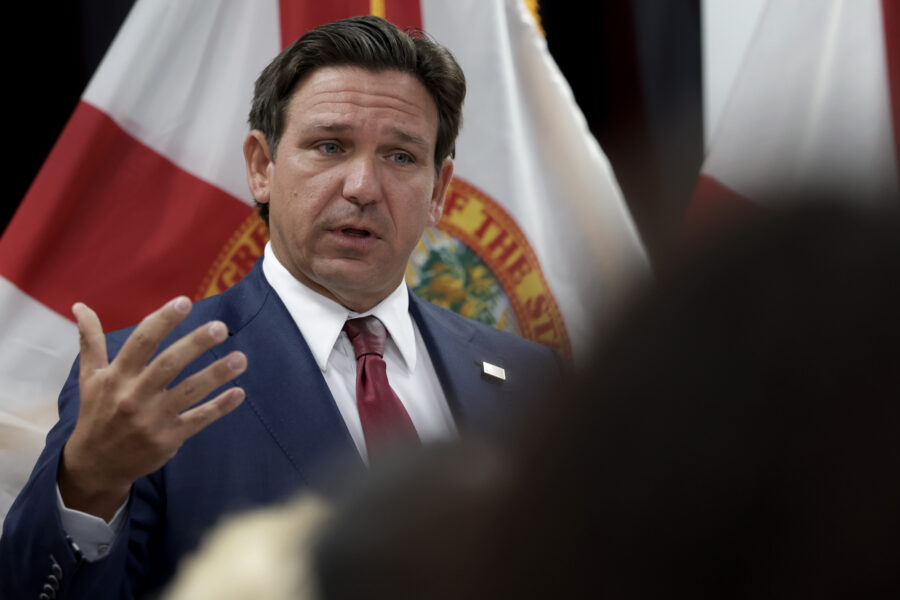The top law enforcement officials of Texas and Alabama are jumping in on the side of ExxonMobil, objecting to a racketeering investigation of the oil giant by the attorney general of the U.S. Virgin Islands.
The attorneys general of Texas and Alabama filed notice that they intend to intervene in the case, contending that Virgin Islands Attorney General Claude Walker is abusing his authority. According to Texas Attorney General Ken Paxton and Alabama Attorney General Luther Strange, Walker overstepped his bounds in opening the investigation that has no legal basis.
In a filing in Texas state court where Exxon sued Walker a month ago, Paxton and Strange said they agreed with Exxon’s argument that the investigation violates the company’s Constitutional rights. They also said Exxon is correct in arguing that the Virgin Islands’ hiring of an outside law firm to handle the probe on a contingency-fee basis is an unconstitutional delegation of prosecutorial power.
“We agree with ExxonMobil that serious jurisdictional concerns exist, but to protect the fundamental right of impartiality in criminal and quasi-criminal investigations, we intervene,” said the plea filed by the attorneys general for Texas and Alabama. Exxon’s corporate headquarters is in Texas.
In a statement, Walker said investigating fraud is something that attorneys general do every day and that Exxon may be continuing to misrepresent the risks of climate change to investors.
“I have no substantive comment on the effort by the Texas and Alabama Attorney Generals’ effort to intervene in ExxonMobil’s lawsuit, which seeks to justify its refusal to cooperate with our investigation,” Walker said in the statement.
“I seek to protect consumers and investors in the Virgin Islands; they wish to lend a hand to ExxonMobil, which is their choice.”
Michael Gerrard, a professor of environmental law at Columbia University, said it is difficult to predict the weight that Paxton and Strange’s action will carry.
“It is more for appearances—what we lawyers call atmospherics—than for substance,” he said. “This is more a reflection of the politics of the states. This is a political and ideological brawl being carried out in judicial context.”
Walker subpoenaed a wide swath of Exxon records covering almost four decades, citing suspicion that Exxon’s statements on climate change may have violated the territory’s anti-racketeering law and defrauded the government and consumers of the islands.
Virgin Islands authorities are relying on its “Baby RICO” statute, one of a class of racketeering laws adopted by more than two dozen states and territories after Congress passed the 1970 Racketeer Influenced and Corrupt Organizations Act, known as RICO. The laws were intended to give officials stronger weapons for prosecuting organized crime.
Walker engaged the Washington, D.C., law firm of Cohen Milstein Sellers & Toll to handle the case. Cohen Milstein and Linda Singer, the firm’s lead attorney in the case, were named as co-defendants in the Exxon suit against Walker. Neither Singer, Paxton’s office, nor Exxon responded to requests for comment.
Strange said he decided to jump into the fray on Exxon’s side because he thinks Walker is conducting a “witch hunt.”
“The Attorney General of the Virgin Islands, an American Territory, is abusing the power of his government office to punish and intimidate a company for its climate change views which run counter to that of his own,” Strange said in a statement.
“This is more than just a free speech case,” Strange said. “It is a battle over whether a government official has a right to launch a criminal investigation against anyone who doesn’t share his radical views.”
Gerrard said the intervention of the two state attorneys general lends some credibility to Exxon’s argument.
“It shows it is not a corporation acting alone in terms of protesting,” Gerrard said. “Exxon now has two sovereign states agreeing with them.”
Walker is part of a coalition of Democratic attorneys general organized by New York State Attorney General Eric Schneiderman. They vowed to hold fossil fuel companies accountable for their conduct on climate change. The first sentence of Paxton and Strange’s motion to intervene cites a comment Walker made at the announcement of the coalition. Paxton and Strange are both Republicans.
Exxon sued in Texas state court last month to block Walker’s subpoena for documents on climate change. Exxon argues the subpoena is invalid because it seeks records beyond the five-year statute of limitations of the territory’s Baby RICO law, and that it violates the company’s constitutional rights and “constitutes an abuse of process, in violation of common law.”
In their filing, Paxton and Strange said they support Exxon’s contention that the investigation is politically motivated.
“General Walker’s investigation appears to be driven by ideology, and not law, as demonstrated not only by his collusion with Cohen Milstein, but also by his request for almost four decades worth of material from a company with no business operations, employees, or assets in the Virgin Islands,” they said.
Paxton and Strange said that by hiring an outside law firm to handle the investigation, the Virgin Islands case is driven more by the firm’s desire to collect contingency fees based on civil settlements rather than following the law and finding the truth.
“Contingency fee arrangements cut against the duty of impartiality by giving the attorney that represents the government a financial stake in the outcome,” according to the intervention notice. “Thus, the use of contingency fees is highly suspect.”
Walker defended the use of outside lawyers, saying it levels the playing field and has been upheld by the U.S. Supreme Court.
“ExxonMobil’s annual revenue is about five times the gross domestic product of the Virgin Islands,” he said. “The use of outside counsel permits us to apply the law to even the largest corporations.”
Intervention by the AGs will likely have few practical consequences, according to Robert Percival, director of the Environmental Law Program at the University of Maryland School of Law.
“It’s political grandstanding on the parts of the AGs,” Percival said.
About This Story
Perhaps you noticed: This story, like all the news we publish, is free to read. That’s because Inside Climate News is a 501c3 nonprofit organization. We do not charge a subscription fee, lock our news behind a paywall, or clutter our website with ads. We make our news on climate and the environment freely available to you and anyone who wants it.
That’s not all. We also share our news for free with scores of other media organizations around the country. Many of them can’t afford to do environmental journalism of their own. We’ve built bureaus from coast to coast to report local stories, collaborate with local newsrooms and co-publish articles so that this vital work is shared as widely as possible.
Two of us launched ICN in 2007. Six years later we earned a Pulitzer Prize for National Reporting, and now we run the oldest and largest dedicated climate newsroom in the nation. We tell the story in all its complexity. We hold polluters accountable. We expose environmental injustice. We debunk misinformation. We scrutinize solutions and inspire action.
Donations from readers like you fund every aspect of what we do. If you don’t already, will you support our ongoing work, our reporting on the biggest crisis facing our planet, and help us reach even more readers in more places?
Please take a moment to make a tax-deductible donation. Every one of them makes a difference.
Thank you,













